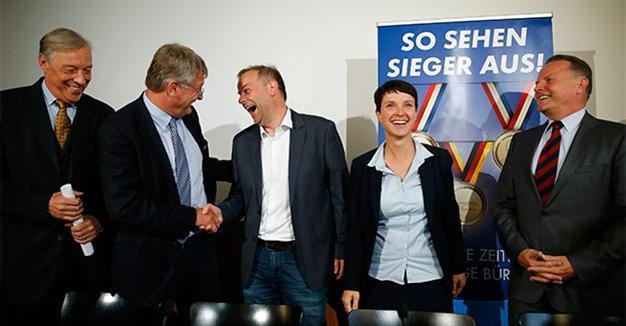Germany’s anti-migrant populists beat Merkel’s party in local vote
SCHWERIN, Germany

Leader of the anti-immigration party Alternative for Germany (AfD) Joerg Meuthen (2nd L) congratulates Leif-Erik Holm, Mecklenburg-Vorpommer top candidate as other party members Georg Pazderski (R) and chairwoman Frauke Petry (2nd R) arrive for a press conference in Berlin, Germany, September 5, 2016. REUTERS photo
German Chancellor Angela Merkel’s Christian Democrats (CDU) were beaten into third place by the anti-immigrant and anti-Islam Alternative for Germany (AfD) party in a north-eastern state election on Sept. 4.
The xenophobic AfD clinched around 21 percent in its first bid for seats in the regional parliament of Mecklenburg-Western Pomerania, results showed after most ballots were counted, AFP reported.
Merkel’s CDU garnered just 19 percent in its worst ever score in the north-eastern state, while the Social Democrats (SPD) maintained top place with around 30 percent.
AfD’s lead candidate Leif-Erik Holm called it a “proud result for a young party” as the populists secured seats on the opposition benches of the ninth out of 16 regional parliaments with the showing.
“The icing on the cake is that we have left Merkel’s CDU behind us... maybe that is the beginning of the end of Merkel’s time as chancellor,” he said.
Although the former Communist state is Germany’s poorest and least populous, it carries a symbolic meaning as it is home to Merkel’s constituency Stralsund.
Together with Berlin’s elections in two weeks, the Sept. 4 polls are a key test ahead of general elections next year, when Merkel’s decision exactly a year ago to let in tens of thousands of Syrian and other migrants is expected to be a key point of contention.
Merkel said on Sept. 5 that she was unhappy about the results of the election but added her refugee policies have been right all along.
Merkel acknowledged her pro-refugee position in the last year had a lot to do with her conservative party’s drubbing in the votes.
“I’m very unsatisfied with the outcome of the election,” Reuters quoted Merkel as saying.
“Obviously it has something to do with the refugee question. But I nevertheless believe the decisions made were right and we have to continue to work on them.”
Meanwhile, the number of migrants claiming German welfare benefits soared by 169 percent last year, data showed on Sept. 5, a figure likely to further boost anti-immigrant groups such as the AfD.
Around 975,000 migrants were receiving benefits in accordance with the Act on Benefits for Asylum Seekers at the end of 2015, the Federal Statistics Office said. That marked the sixth consecutive yearly rise and compared with 363,000 in 2014.
This data include migrants with temporary residence permits and those who cannot be deported for the time being. They do not include those with refugee status or those entitled to asylum, who receive social benefits if they need help.
